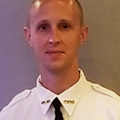What is mediocrity? It sounds like some old-fashioned word that imposes a kind of harshness on new-age idealism. Yet, at its core, it merely is a middle ground between horrible and greatness. In its simplest form, you could say it’s just OK. It is neither awesome nor bad. However, in our world of life and death, in our service of honor, courage and integrity, being or performing just OK, as we know, is very not OK.
The citizens who we serve expect way more than OK during their time of need. Members need more than OK leadership from their superiors. The brothers and sisters who we fight alongside need more than OK on the fireground, in the station or wherever our job takes us.
Potential to spread
If unchecked, mediocrity can grow in any of us, from the newest rookie to the fire chief. It might look different, and the outcomes might vary, but it is dangerous regardless of who is under its thumb. Like a malignant tumor, mediocrity starts off small and unassuming. Perhaps it’s missing a step in a check-off or putting off training or any of a thousand little things that are so easy to be overlooked or to say can be done another time or to leave to someone else. However, like that little tumor, mediocrity grows slowly over time.
Given enough time, a tumor spreads to other body systems and parts. Mediocrity has the capability to spread to others. If you’re a leader, this is compounded. Your example of mediocrity leaves a toxic wake that washes over all of those who are below you. If you’re a company officer, this might be only a couple of people. However, if you’re a department head or a chief, a trickle-down effect occurs. This is perhaps the most dangerous circumstance: Like brain cancer, if the head of a department is infected with cancerous mediocrity, the “infection” very often creates a toxic culture below.
Leaders are much like a father figure, who must serve as a model of the behavior that’s wanted in the men and women who they lead. Leaders who are a model of mediocrity are unacceptable, and all actions require personal accountability, even theirs.
Much like chemotherapy, which can rid the body of the toxic cancer cells, a good model can cure a culture of mediocrity. Of course, this won’t be pain-free nor happen overnight.
Although change to excellence from mediocrity is easier from the top down, it also is possible for that change to occur from the bottom up. However, the latter is much slower, because the rate of influence is bogged down as it makes its way up the chain of command.
Be on guard
Yes, it is absolutely true that our actions can influence others. This isn't the same for the cancer cell, which can spread unilaterally from superior to inferior or inferior to superior. Therefore, despite one’s level in the organization, you always must be on guard against those who are around you who slid into mediocrity. It’s tempting to think, “Well, they’re just doing the minimum and are doing fine.” However, by doing that, you give the cancer an opening to grow—within yourself but also within the organization.
You always must remember your mission and the oath that you took to serve and protect. At no point when you recited the oath with your right hand in the air did you say that when you were tired or burned out or weren’t being paid enough you could give less than 100 percent. Leaders within the organization, whether on the line or not, never said that they could let their men and women down or not serve them diligently with the same fervor that they possessed when they rode backward. You always must keep the mission right in front of your face. Ninety-nine percent when no one is looking simply isn’t enough. One hundred percent 100 percent of the time can be the only answer.
Don’t give in to the allure of just OK just that one time. You can’t afford to lose the edge in a career that has deadly consequences, not only for us but for the helpless.
About the Author

Zachary Brown
Zachary Brown is a captain at the DeKalb County, GA, Fire Rescue Department (DCFR). He has been in the fire service for 15 years, the past 12 of which have been with the DCFR. Brown is a paramedic and has been a member of the DCFR technical rescue and dive teams.
